Mercedes C-Class Sedan VS SsangYong Korando – Specs, Efficiency & Price Comparison
Which model is the better choice – the Mercedes C-Class Sedan or the SsangYong Korando? We compare performance (680 HP vs 190 HP), boot capacity (455 L vs 551 L), efficiency (1.60 L vs 16.80 kWh7.50 L), and of course, the price (41200 £ vs 27000 £).
Find out now which car fits your needs better!
The Mercedes C-Class Sedan (Sedan) is powered by a Diesel MHEV, Petrol MHEV or Plugin Hybrid engine and comes with a Automatic transmission. In comparison, the SsangYong Korando (SUV) features a Petrol or Electric engine and a Manuel or Automatic gearbox.
When it comes to boot capacity, the Mercedes C-Class Sedan offers 455 L, while the SsangYong Korando provides 551 L – depending on what matters most to you. If you’re looking for more power, you’ll need to decide whether the 680 HP of the Mercedes C-Class Sedan or the 190 HP of the SsangYong Korando suits your needs better.
There are also differences in efficiency: 1.60 L vs 16.80 kWh7.50 L. In terms of price, the Mercedes C-Class Sedan starts at 41200 £, while the SsangYong Korando is available from 27000 £.
Compare all the key specs now and find out which model fits your lifestyle best!
Mercedes C-Class Sedan
The Mercedes-Benz C-Class Sedan embodies a seamless blend of luxury and performance, capturing the quintessential essence of sophisticated driving. Its elegant design is complemented by a meticulously crafted interior, featuring premium materials and innovative technology to enhance comfort and convenience. On the road, the C-Class Saloon offers an impressive driving experience, harmonising precise handling with a composed and comfortable ride.
details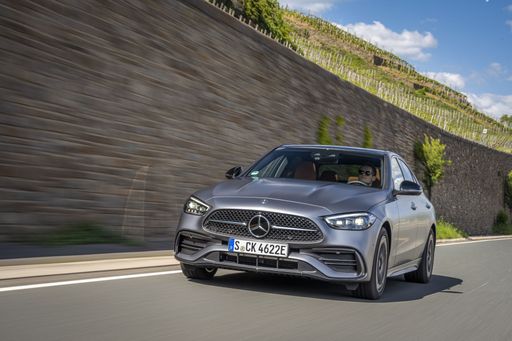 @ group-media.mercedes-benz.com
@ group-media.mercedes-benz.com
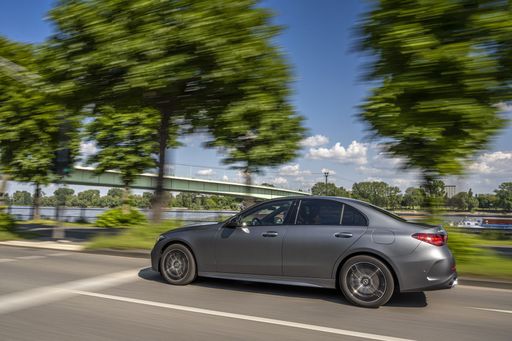 @ group-media.mercedes-benz.com
@ group-media.mercedes-benz.com
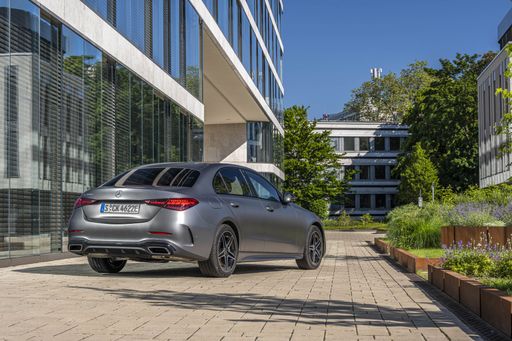 @ group-media.mercedes-benz.com
@ group-media.mercedes-benz.com
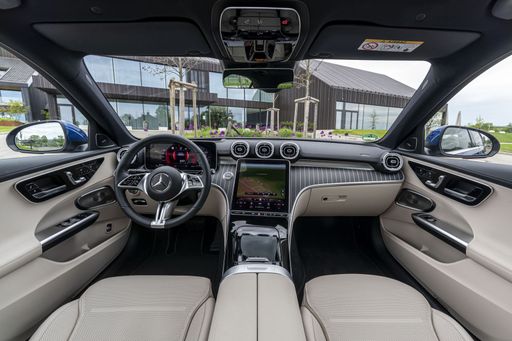 @ group-media.mercedes-benz.com
@ group-media.mercedes-benz.com
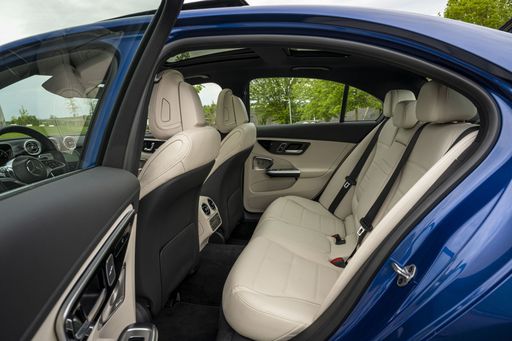 @ group-media.mercedes-benz.com
@ group-media.mercedes-benz.com
SsangYong Korando
The SsangYong Korando offers a blend of contemporary design and practicality, making it an appealing choice for urban adventurers. Its spacious interior and comfortable seating ensure a pleasant driving experience for both driver and passengers. With its reliable performance and advanced features, the Korando stands out in the competitive SUV market.
details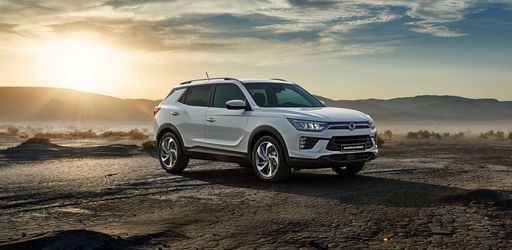 @ Ssangyong
@ Ssangyong
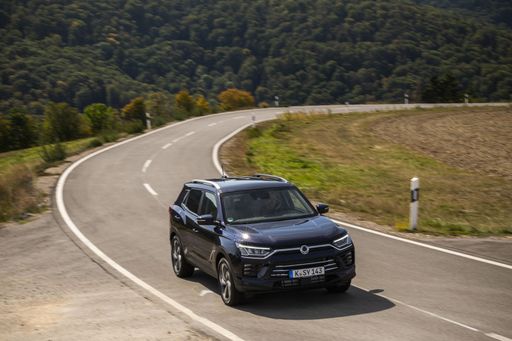 @ Ssangyong
@ Ssangyong
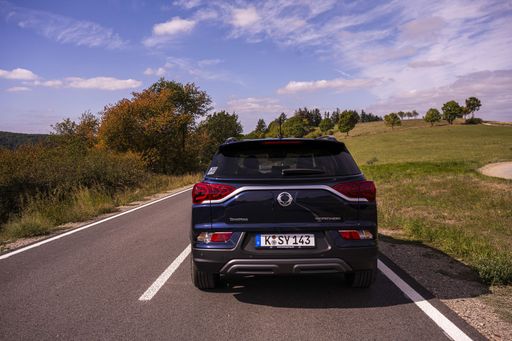 @ Ssangyong
@ Ssangyong
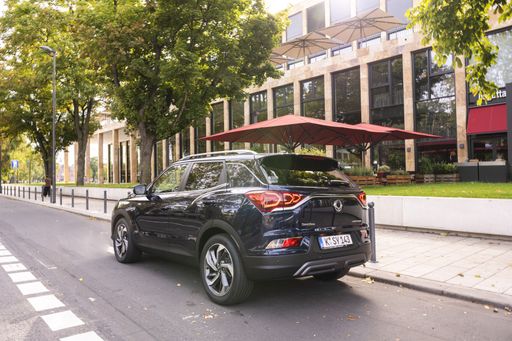 @ Ssangyong
@ Ssangyong
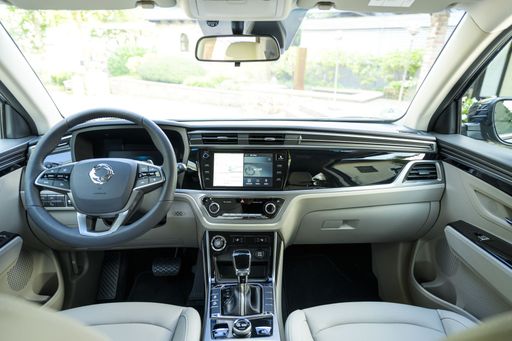 @ Ssangyong
@ Ssangyong

|

|
|
|
|
Costs and Consumption |
|
|---|---|
|
Price
41200 - 103100 £
|
Price
27000 - 42000 £
|
|
Consumption L/100km
1.6 - 9 L
|
Consumption L/100km
7.5 - 8.6 L
|
|
Consumption kWh/100km
-
|
Consumption kWh/100km
16.80 kWh
|
|
Electric Range
11 - 117 km
|
Electric Range
339 km
|
|
Battery Capacity
19.50 kWh
|
Battery Capacity
-
|
|
co2
41 - 205 g/km
|
co2
0 - 197 g/km
|
|
Fuel tank capacity
40 - 66 L
|
Fuel tank capacity
50 L
|
Dimensions and Body |
|
|---|---|
|
Body Type
Sedan
|
Body Type
SUV
|
|
Seats
5
|
Seats
5
|
|
Doors
4
|
Doors
5
|
|
Curb weight
1695 - 2195 kg
|
Curb weight
1517 - 1840 kg
|
|
Trunk capacity
280 - 455 L
|
Trunk capacity
551 L
|
|
Length
4751 - 4842 mm
|
Length
4450 - 4465 mm
|
|
Width
1820 - 1900 mm
|
Width
1870 mm
|
|
Height
1438 - 1458 mm
|
Height
1620 - 1645 mm
|
|
Payload
480 - 610 kg
|
Payload
410 - 463 kg
|
Engine and Performance |
|
|---|---|
|
Engine Type
Diesel MHEV, Petrol MHEV, Plugin Hybrid
|
Engine Type
Petrol, Electric
|
|
Transmission
Automatic
|
Transmission
Manuel, Automatic
|
|
Transmission Detail
Automatikgetriebe
|
Transmission Detail
Manual Gearbox, Automatic Gearbox, Reduction Gearbox
|
|
Drive Type
Rear-Wheel Drive, All-Wheel Drive
|
Drive Type
Front-Wheel Drive, All-Wheel Drive
|
|
Power HP
183 - 680 HP
|
Power HP
163 - 190 HP
|
|
Acceleration 0-100km/h
3.4 - 8.6 s
|
Acceleration 0-100km/h
8.40 s
|
|
Max Speed
230 - 280 km/h
|
Max Speed
156 - 191 km/h
|
|
Torque
250 - 1020 Nm
|
Torque
260 - 360 Nm
|
|
Number of Cylinders
4
|
Number of Cylinders
4
|
|
Power kW
135 - 500 kW
|
Power kW
120 - 140 kW
|
|
Engine capacity
1496 - 1999 cm3
|
Engine capacity
1497 cm3
|
General |
|
|---|---|
|
Model Year
2024 - 2025
|
Model Year
2021 - 2023
|
|
CO2 Efficiency Class
D, G, E, B
|
CO2 Efficiency Class
F, G, A
|
|
Brand
Mercedes-Benz
|
Brand
SsangYong
|
Mercedes C-Class Sedan
Unveiling the Mercedes-Benz C-Class Sedan: A Symphony of Innovation and Performance
The Mercedes-Benz C-Class Sedan is a statement of luxury and innovation. With impeccable design, cutting-edge technology, and remarkable performance, it continues to set benchmarks in the automotive world. In this article, we explore the technical marvels and innovations that define the latest iteration of this iconic series.
Innovative Powertrains: Driving Efficiency and Performance
Mercedes-Benz has expertly engineered the C-Class Sedan to offer a diverse range of powertrains. From mild hybrids to plug-in hybrids, the C-Class blends performance with efficiency. The petrol and diesel mild-hybrid options boast outputs ranging from 183 to 422 PS, while the plug-in hybrids can deliver up to an impressive 680 PS. These innovative powertrains are designed to reduce emissions without compromising on driving pleasure.
The electrified options also offer a remarkable electric-only range of up to 116 km, allowing for more eco-friendly urban driving. Meanwhile, the advanced 9G-TRONIC automatic transmission enhances performance by ensuring smooth and responsive gear changes.
State-of-the-Art Technology: Connecting You to the Road
The C-Class Sedan is equipped with the latest Mercedes-Benz technology, offering an unparalleled driving experience. The MBUX (Mercedes-Benz User Experience) system, featuring natural language understanding, keeps drivers informed and entertained while maintaining focus on the road.
The display's high-resolution graphics provide clear information, and the optional Augmented Reality Navigation makes following directions a seamless task. Furthermore, the vehicle’s driver assistance systems, such as Active Lane Keeping Assist and Adaptive Cruise Control, ensure a safer and more relaxing journey.
Design and Comfort: Luxury on Four Wheels
With its elegant styling, the C-Class Sedan is a striking figure on roads worldwide. The exterior boasts dynamic lines and a bold front grille, exuding a sense of confidence and prestige. Inside, the cabin is a haven of comfort, employing high-quality materials and meticulously crafted details.
The roomy interior can comfortably seat five passengers, while the boot offers ample space for luggage, making it ideal for long-distance travel. Options for customisation from the AMG Line to Avantgarde packages allow buyers to tailor their vehicle to their personal tastes.
Environmental Consciousness: Leading the Charge for a Sustainable Future
Mercedes-Benz is committed to sustainable mobility, and the C-Class Sedan exemplifies this with its eco-friendly features. The plug-in hybrid models offer significant reductions in fuel consumption and CO2 emissions, with some versions achieving as low as 0.4 L/100 km and 11 g/km CO2 emissions.
By integrating innovative battery technologies and energy recovery systems, Mercedes-Benz supports greener driving practices while maintaining the exhilarating performance expected from their vehicles.
Conclusion: The C-Class Sedan - A Class Apart
The Mercedes-Benz C-Class Sedan represents the pinnacle of automotive engineering and luxury. With its variety of powertrains, advanced technological features, emphasis on comfort, and commitment to sustainability, it is a vehicle designed not only to meet the demands of modern drivers but to exceed them. Once again, Mercedes-Benz has delivered a car that is as exciting to drive as it is responsibly engineered.
SsangYong Korando
Discovering the SsangYong Korando: Combining Performance with Innovation
The SsangYong Korando has persistently evolved, emerging as a formidable presence in the compact SUV segment. With a blend of intriguing design, versatile engine options, and cutting-edge technology, the Korando aims to cater to a diverse array of driving preferences and needs. In this article, we delve into the technical intricacies and pioneering innovations that define the vehicle.
A Versatile Engine Line-up: Catering to Petrol and Electric Enthusiasts
The Korando provides a remarkable variety of powertrains, accommodating drivers who favour both traditional petrol engines and modern electric motors. For petrol enthusiasts, the Korando comes equipped with a 1.5 GDI-T engine, boasting a power output of 163 PS. Available in both manual and automatic transmission, and offering either front-wheel or all-wheel drive, these variants promise a dynamically engaging driving experience.
The brand’s commitment to sustainability is evident with the introduction of the E-Motion model, which is powered by an electric motor delivering 190 PS. With a commendable range of 339 km and an energy consumption of 16.8 kWh/100km, the E-Motion exemplifies SsangYong's ambition to shape the future of eco-friendly motoring.
Technical Excellence: Performance and Efficiency
With a peak speed ranging between 156 to 191 km/h, the Korando ensures that drivers experience both agility and responsiveness. The petrol variants offer a respectable efficiency, with fuel consumption spanning from 7.5 to 8.6 L/100km, while the electric variant promotes zero emissions. This makes the Korando an optimal choice for those conscious of both performance and environmental impact.
Acceleration from 0 to 100 km/h in just 8.4 seconds—paired with a torque range of 260 to 360 Nm—ensures an exhilarating ride whether navigating city streets or venturing onto open highways. Moreover, with a robust towing capacity, the Korando stands as a reliable companion for any adventure.
Interior Quality and Innovative Features
Inside the Korando, occupants are greeted by a spacious cabin designed with emphasis on comfort and practicality. Advanced infotainment systems seamlessly integrate with connectivity features, ensuring that every journey is both entertaining and stress-free. Emphasising safety, the Korando is equipped with multiple driver-assistance systems, including adaptive cruise control and lane-keeping assist.
Mirroring its exterior aesthetics, the interior is crafted with premium materials, providing a serene ambience throughout the ride. With abundant luggage space, a family of five can effortlessly embark on long-distance travels without compromises on space or comfort.
Conclusion: A Synergy of Tradition and Modernity
The SsangYong Korando seamlessly merges robust performance with cutting-edge innovation, appealing to a wide demographic of drivers. Whether drawn to the unmistakable power of its petrol engines or the sustainable allure of its electric variant, prospective owners are sure to find a model that complements their lifestyle. The Korando remains an impactful player in the SUV landscape, continually adapting to the demands of modern-day motoring while staying true to its heritage.
The prices and data displayed are estimates based on German list prices and may vary by country. This information is not legally binding.
